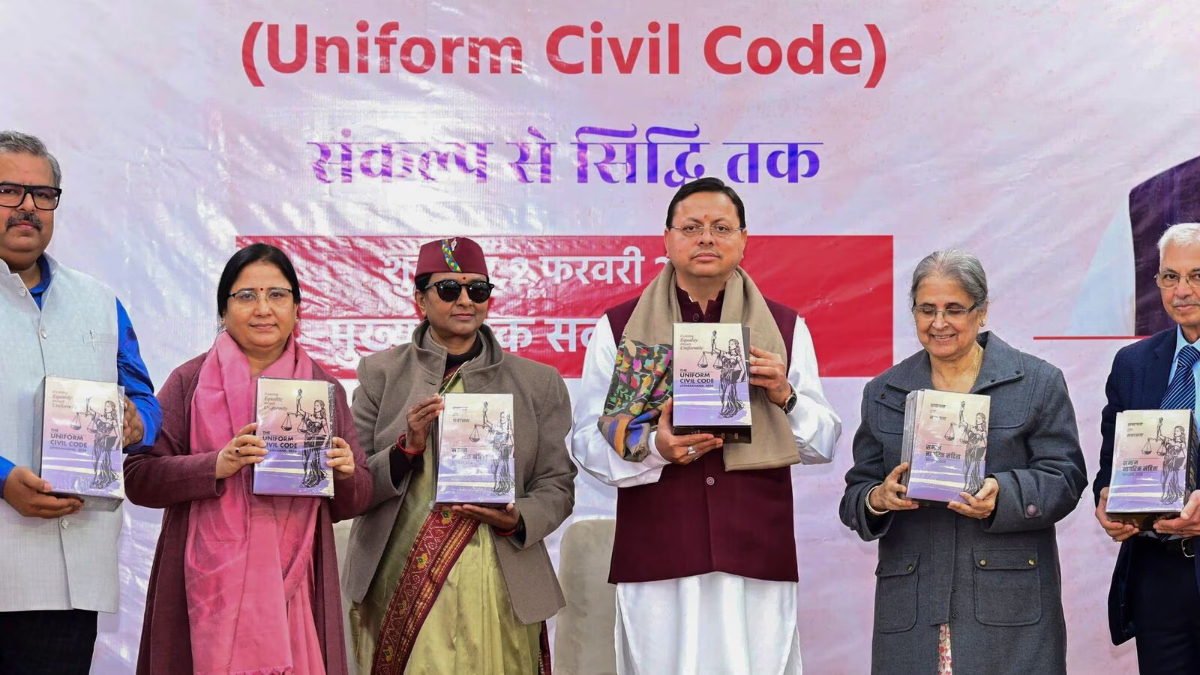The Uniform Civil Code (UCC) Bill, which was introduced in the Uttarakhand Assembly on Tuesday, ventures into unexplored territory and imposes strict conditions on consensual relationships between adults. This raises concerns about privacy and personal freedom from a constitutional standpoint.
The bill includes various provisions for heterosexual couples in live-in relationships. Firstly, it mandates compulsory registration with the state when initiating or ending a live-in relationship. These records will be maintained at police stations. Additionally, the bill ensures that women receive maintenance if they are abandoned by their partners. Furthermore, it stipulates a jail term of up to six months for individuals who fail to produce a “certificate” of their live-in relationship.
Essentially, the UCC Bill aims to treat heterosexual live-in relationships on par with marriages. A specific section within the proposed Code addresses live-in relationships, defining them as a partnership between a man and a woman who cohabit in a shared household in a marriage-like manner, as long as such relationships are not prohibited.
According to the bill, partners must inform the “Registrar” within one month of entering into or terminating a live-in relationship. Failure to register a live-in relationship can result in a jail term of up to three months. Moreover, individuals convicted of not producing a certificate of their live-in relationship may face a term of six months.
Overall, the UCC Bill in the Uttarakhand Assembly introduces novel measures that regulate consensual relationships between adults. However, it also raises concerns about privacy and personal liberty, as it imposes stringent terms and conditions.
An official from the state government justified these provisions by stating that the main reason behind them was the concern over serious crimes committed by live-in couples. The official also claimed that registration would serve as a deterrent for individuals with malicious intentions.
During the expert committee’s public consultation in remote areas of Uttarakhand, incidents of live-in crimes were fresh in the minds of the people, according to the official. As a result, parents and elderly individuals expressed their desire for action to be taken. The committee acknowledged the importance of personal freedom but also recognized the interests of young individuals, leading them to find a solution.
However, many experts expressed their skepticism, stating that compulsory registration infringes upon the freedom to choose not to marry. They argued that the state should not interfere in the consensual actions of its citizens. Senior advocate Geeta Luthra highlighted that this intrusion into privacy contradicts the fundamental right recognized in the Puttaswamy ruling.
Importantly, the proposed Code also includes provisions for maintenance of women who are “deserted” by their live-in partners, similar to married women. Section 388 states that if a woman is deserted by her live-in partner, she can claim maintenance through the competent court in the place where they last lived together. In such cases, the relevant provisions of the Code will apply accordingly.
Currently, live-in relationships are only recognized under the Domestic Violence Act, 2005 as “domestic relationships.” This law, which also includes provisions for maintenance, only acknowledges relationships that are “similar to marriage” when women report domestic violence.
While the intention behind compulsory registration may be to protect women, it is important to consider that not all women may desire this level of state intervention. This approach may be seen as narrow-minded when dealing with the concept of freedom.
In the Velusamy v Patchaiammal case of 2010, the Supreme Court made a significant ruling regarding the Domestic Violence Act. The court stated that simply spending weekends together or engaging in a one-night stand does not qualify as a “domestic relationship.”
The proposed law will have jurisdiction over individuals residing in Uttarakhand, as well as those who are residents of Uttarakhand but live elsewhere in India.
According to Section 378 of the Code, partners in a live-in relationship are required to submit a statement. The section states, “Partners in a live-in relationship, whether they are residents of Uttarakhand or not, must submit a statement of their live-in relationship to the Registrar within the jurisdiction they reside in, as per sub-section 1 of section 381.”
Residents of Uttarakhand who are in a live-in relationship outside the state can now submit a statement of their relationship to the Registrar. This provision is stated in sub section 1 of section 381. The Bill also acknowledges that children born in such relationships are legitimate. This was already the legal position, but it is now officially codified.
Similar to the powers granted to magistrates in the anti-conversion legislation, the Registrar has the authority to conduct a “summary inquiry” and can summon the live-in partners or any other relevant individuals for verification. Once the inquiry is complete, the Registrar will forward the record to the relevant police station. If either partner is below 21 years of age, the parents or guardians will also be informed.
In the 2017 Puttaswamy ruling, the Supreme Court recognized the right to privacy and cited various precedents. These precedents emphasized that personal information unrelated to public activities or interests should not be disclosed unless there is a larger public interest that justifies its disclosure. The Court highlighted that privacy allows individuals to develop personal relationships without interference from the community or the State. It also stated that the right to live with dignity and the right to privacy are both recognized as dimensions of Article 21 in the Indian Constitution.

